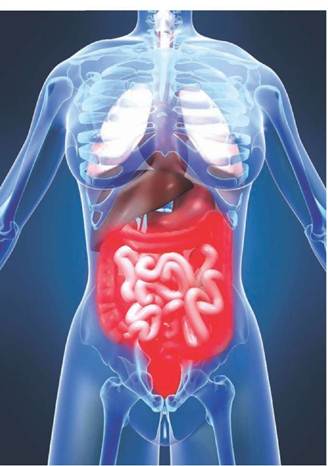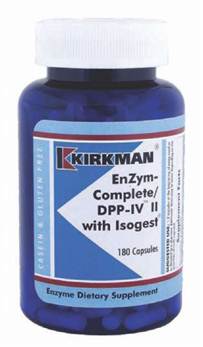Enzymes
- What are enzymes?
- Digestive enzymes
- Why should I take a digestive enzyme supplement?
- What are the potential consequences of not having the proper balance of digestive enzymes?
- Why might i be lacking the enzymes i need?
- What is unique about kirkman's family of digestive enzymes?
- The isogest® factor in kirkman's broad-spectrum
- Why is isogest® such an important discovery?
- The pancreatic enzymes
- Enzym-complete/dpp-iv™ ii with isogest®
What are enzymes?
Enzymes are protein-based constituents of living organisms, plant and animal, that regulate the activities of all living cells. Without enzymes, there would be no life.
The human body contains in excess of 3,000 different enzymes that function in chemical reactions, metabolism, digestion, immune response and many other body processes. Enzymes are considered catalysts of biochemical reactions. Each enzyme in the body has a very specific job to accomplish and rarely has multiple functions. If the enzyme necessary to catalyze a given reaction is deficient or not available, that reaction can't take place.
Digestive enzymes
Digestive enzymes are those enzymes found in the body that function as biological catalysts to begin the breakdown of foods so that the important nutrients in the food can be properly absorbed and utilized.
All food contains nutrients and potential nutritional value; however, until enzymes start the digestive process, the nutrients are "locked up" in the cellular structure and are not yet available to be absorbed by the body. For example, the fiber and vitamins in your breakfast cereal provide no value until your digestive enzymes start the digestion process and unlock the nutrients. Similarly, the meat or fish you consume does not deliver the protein necessary for growth and development until protease enzymes digest the protein.
Why should I take a digestive enzyme supplement?

Proper and complete digestion is essential in maintaining good health because without digestion, the nutrients you consume from the food you eat won't be adequately absorbed. Digestive enzymes also play a key role in gastrointestinal health because they can exert a powerful effect in addressing a full range of commonly recognized gastrointestinal disturbances, including intestinal irritation, maldigestion, malabsorption, intestinal hyperpermeability, gut dysbiosis, and food allergies and sensitivities Clinical experience with the use of digestive enzymes has shown that these conditions can be supported by the use of broad-spectrum enzyme formulations.
What are the potential consequences of not having the proper balance of digestive enzymes?
- malabsorption of nutrients can lead to malnutrition, abnormal growth patterns, improper organ development and immune system impairment
- malnutrition can result in vitamin and mineral deficiencies, poor or impaired wound healing, skin conditions, behavioral problems, intestinal flora imbalances, and lack of immune system support leading to frequent illness
- feeling of fullness or bloating after meals
- gas, diarrhea, constipation, and/or foul smelling stools
- poor health and conditions of the digestive system, colon, or rectum
Why might i be lacking the enzymes i need?
The human body naturally produces digestive enzymes; however, the following situations can leave an individual lacking in necessary enzymes:
- nutritional deficiency adversely impacts enzymes
- enzyme production can decrease with age
- cooking of foods destroys naturally occurring enzymes that work with human digestive enzymes
- stress can deplete enzymes
- illness can inhibit enzyme production
- injury can tax enzyme levels
What is unique about kirkman's family of digestive enzymes?
All of Kirkman's enzyme products are made from plant derived enzymes and are encapsulated in all vegetable capsules manufactured from pine cellulose. Our enzymes are:
- casein free
- gluten free
- soy free
- sugar free
- preservative free
- color free
- free of other common allergens
- free of sulfites
- free of fish and tree nuts
The isogest® factor in kirkman's broad-spectrum
Enzymes that digest carbohydrates are a major component of broad- spectrum enzymes. The human digestive tract contains seven carbohydrase enzymes that split dietary disaccharides into free monosaccharides. Prior to Kirkman's introduction of Isogest®, commercially available digestive enzyme products contained enzyme ingredients that had the activity of only some of these disaccharidase enzymes. A very important enzyme called sucrose- isomaltase was only partially represented in these commercial products. The invertase or sucrase portion of the enzyme was present, but the isomaltase fraction was not - and for a good reason: there is no commercially available form of isomaltase available in the world.
Rafail Kushak, Ph.D. and Timothy Buie, M.D. of MassGeneral Hospital for Children in Boston confirmed the importance of this missing enzyme fraction in January 2004. This was done by an intestinal biopsy study involving 100 special needs children. The study showed that 60% of these patients had weak lactase activity and 25-40% had weak isomaltase/palatinase activity. Similar results were noted in an October 2005 paper in the Journal of Pediatric Gastroenterology and Nutrition published by Kushak, Winter, Farber, and Buie of MassGeneral Hospital for Children. This study indicated a need for additional carbohydrase enzymes in special needs situations. These studies were evidence for the need of an enzyme providing isomaltase/palatinase activity to fill a void in commercially available digestive enzyme products.
These studies provided the impetus for Kirkman® to begin searching for an enzyme that had this isomaltase/palatinase activity. Kirkman®, in conjunction with the National Enzyme Company of Forsyth, MO, found such an enzyme that Kirkman® registered as the trademark Isogest®. Isogest® has the ability to split isomaltose into two molecules of glucose and to split palatinose into one molecule of glucose and one molecule of fructose. This is a revolutionary ingredient in the world of enzymology since commercially available enzyme products never had this isomaltase enzyme capability. Only Kirkman's enzymes contain Isogest®, for which Kirkman® has a patent pending.
Why is isogest® such an important discovery?
When there is weak isomaltase/palatinase activity in the body as found in the studies cited, enzyme supplementation is called for. Prior to Isogest® there was no means through commercially available enzyme products to get that supplementation. When insufficient isomaltase/palatinase activity is present, isomaltose and palatinose, two complex sugars, remain partially undigested. Isomaltose is found in corn syrups, candies, and in complex starches. Palatinose is produced in the body primarily as a by-product of bacterial breakdown of other sugars and starches. When isomaltose and palatinose remain partially undigested, gas, bloating, constipation or diarrhea, and other intestinal disturbances can result that can contribute to gastrointestinal pain.
Kirkman's broad-spectrum enzyme products containing Isogest® finally provide a solution to the missing isomaltase enzyme fraction.
The pancreatic enzymes
When we talk about supplementing with digestive enzymes, we mean the pancreatic enzymes. These are the enzymes that have specific jobs and act only on specific types of food substrates.
When digestive enzyme supplementation is called for or recommended by a health professional, it is imperative that the proper combination of enzymes is chosen in order to address the particular digestive issues present. For example, lipase only digests fats; it does not act on protein or sugar. Sucrase only digests sugars; it has no effect on fat or protein. Proteases and peptidases act on protein, casein, and gluten. Other enzymes do not.
A specific enzyme combination must be selected based on an individual's specific needs. There are many different enzyme products in the marketplace including:
- lipase - specifically addresses fat digestion
- lactase - specifically aids lactose intolerance
- peptidase/protease - digest proteins and peptides including casein and gluten
- DPP-IV (peptidase) - targets casein and gluten
- multi- or broad-spectrum enzymes that digest all food groups
- carbohydrate digesting enzymes
If you know specifically that a person needs a particular enzyme, such as lipase for fats, you can look for that specific enzyme in the product you choose. Usually, however, individuals are not sure which enzymes are needed. In that case, a multi- or broad-spectrum enzyme product would be the best choice. Broad-spectrum enzyme products help digest all food groups including proteins, fats, starches and other carbohydrates, sugars, celluloses, and fiber.
Kirkman® has advanced digestive enzyme products containing Isogest®, a patent pending enzyme component with isomaltase activity. No other commercially available enzymes contain the Isogest® fraction. Kirkman's EnZym-Complete/DPP-IV™ II with Isogest® and Maximum Spectrum Enzym- Complete/DPP-IV™ Fruit Free w/Isogest® are the two products of choice. The latter product is fruit-free, which is important for individuals who are sensitive to pineapple or papaya fruit.
Enzym-complete/dpp-iv™ ii with isogest®
A revolutionary enzyme product from Kirkman.
The human intestinal tract contains seven enzymes that split dietary disaccharides into free monosaccharides. Until now, commercially available enzyme products contained enzyme ingredients that had the activity of only some of these disaccharidase enzymes. One in particular, however, sucrase-isomaltase complex, was only partially represented in these products. Invertase is present in these products to hydrolyze sucrose to yield glucose and fructose, and to hydrolyze other complex sugars that contain fructose, so it acts as a sucrase enzyme. The isomaltase fraction of that human enzyme is not represented because there is no commercially available form of isomaltase in the world.
The importance of this missing enzyme fraction was confirmed in January 2004 by R. Kushak, PhD and T. Buie, MD of MassGeneral Hospital for Children in an intestinal biopsy study involving 100 children with special requirements and sensitivities. The study showed that 60% of these patients had weak lactase activity and 25-45% had weak isomaltase/palatinase activity, which substantiated their special dietary need for an enzyme providing isomaltase/palatinase activity.

This study provided the impetus for Kirkman® to search for an enzyme that had isomaltase/palatinase activity. Kirkman® found that enzyme and trademarked it Isogest®.
Isogest® has the ability to split isomaltose into two molecules of glucose and to split palatinose into one molecule of glucose and one molecule of fructose. The result of including this new enzyme is better, more complete carbohydrate digestion. Currently, no other enzyme product can offer this added activity.
EnZym-Complete/DPP-IV™ II with Isogest® is Kirkman's second generation version of Enzym-Complete/ DPP-IV™. It contains all the enzymes present in Enzym-Complete/DPPIV™ plus Isogest®. The presence of Isogest® gives this product the equivalent activity of the isomaltase fraction of the sucrase/isomaltase enzyme found in the human digestive system.
Individuals currently using Enzym-Complete/DPPIV™ who are getting partial results and still need some improvement or individuals using other enzymes who are not completely satisfied with the results should try EnZym-Complete/DPP-IV™ II with Isogest® formula.









